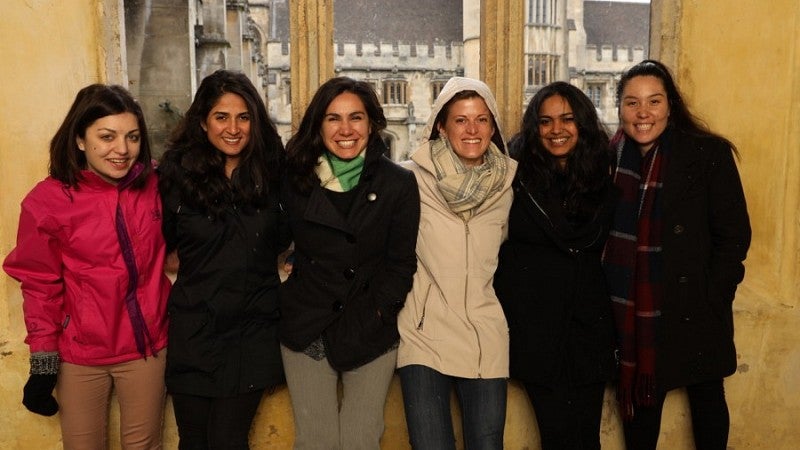Post by Srushti Kamat
Photos courtesy of Srushti Kamat
You’ve probably heard about human rights organizations, but do you know what they do? What constitutes a “human right”? What do people who work in the human rights field do? How can you get involved?
I’ve been interested in covering human rights for a long time, but I didn’t know the answers to these questions until I took a course with the Oxford Consortium for Human Rights that culminated in a weeklong workshop at Oxford. The consortium partners with the Oxford Institute for Ethics, Law and Armed Conflict, an interdisciplinary research program that develops frameworks for international authority and response to armed conflict and reconciliation.
After applying for this highly sought-after fellowship program, I remember thinking there was no way I would get in. I was convinced I’d be the wrong fit. So when I got accepted and became a student fellow, I had no idea what I was getting myself into.

In a quiet law school room on a Thursday evening in January, a team from the University of Oregon — five law students and four undergrads — met for the first time. I was buzzing with excitement. I remember trying to read everyone’s faces, trying to make sense of who they were. The consortium journey I was about to embark on scared and intrigued me at the same time. What was I doing here? My rugged, fieldwork storytelling world of journalism seemed crass in comparison to the sophisticated energy of the rest of the group. And this was just the start.
The course and the workshop was designed to address pre- and post-armed conflict human rights issues. At Oxford, we attended lectures by top faculty at Oxford University, MIT and other institutions who were researching everything from drone warfare to the Rwandan genocide and how urban planning can work with social causes. The workshop included four lectures per day, including discussions, to unpack our learning.
At the end of the program, we prepared a final presentation about a local human rights issue we had worked on for the prior three months. Each university student group presented detailed research on a human rights topic relevant to its local community and why it matters. We also discussed “silence breakers” in the community who chose to challenge the issue. Our presentation was about white supremacy in Oregon.
The consortium is designed to engage U.S. university students from varied socioeconomic backgrounds in conversations about human rights. So, as you might expect, the perspectives were diverse. But when the University of Houston cohort discussed the aftermath of Hurricane Harvey, when the University of Southern California discussed immigration in that state, or when Mercer presented about sex trafficking, we felt deep respect for each other and what people our age are doing to make immediate impacts in their communities. It was humbling to know that, although we were gathered in the halls of an elite institution, the ideas we were discussing were tangible, productive and doable at a local level.

Here are my top four takeaways from the weeklong Oxford workshop:
1. The personal is political, and vice-versa.
Theory is great. Now what? To get people to really hear you, you need to build relationships, make that human connection, establish common experiences and listen to what others have to say. To be understood, you need to translate not only your native language, but also your vocabulary, so “human rights speak” doesn’t get in the way of the message you are trying to convey.- 2. Don’t limit yourselves to a specific discipline right away.
- Allow interdisciplinary opportunities to come your way and embrace them fully.
- 3. Ask for help.
- Without the UO School of Journalism and Communication, I would not have been able to go to Oxford and complete this program. The UO and SOJC scholarships I received pushed me to new heights and allowed me to expand my educational experience and career horizons.
- 4. There’s a lot more to learn.
- I walked away from this workshop realizing there is so much more to study, understand and work on. Now I can’t wait to learn more, gain an even better understand of human rights issues and find a well-educated and dynamic community to collaborate with.

The absolute definition of human rights has been torn apart, argued over and debated endlessly. But here’s what I understood: “Human rights” is about finding a way to give people who have been stripped of basic dignity the right to live without constant fear for their survival. It is about developing collective empathy and subsequent action.
Subjectivity is inevitable, since each country, culture and economy thrives on different values. So human rights within those spaces must be treated differently as well. But in a world that categorizes issues as quickly as it does people, interconnectivity can be easy to miss. Environmental rights are human rights. LGBTQ rights are human rights. The list goes on. The task, then, is to find a way to carry those conversations so that, when we discuss hyper-specific issues, the thread of interconnectivity remains.
Srushti Kamat recently graduated from the UO with degrees in journalism and history. She is pursuing documentary filmmaking and interactive storytelling, and last summer she completed an internship with Oregon Public Broadcasting. She is a recipient of the International Cultural and Services Scholarship and the UO School of Journalism and Communication’s Hall of Achievement Scholarship. Born in Mumbai, India, Srushti was raised in Singapore. Although she finds herself in a love-hate relationship with the question “Where are you from?” she is slowly navigating her identity through thesis research and cofounding a company that aims to empower women of color to share their own stories. You can see more of her work on her online portfolio and follow her on Twitter @srushtikamat.

